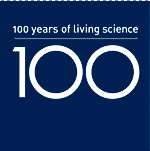Iris Pritchard-Davies
(Administration, CGC, 1940's)
This memory is a conversation between Iris Pritchard-Davies and Anne Cook. Iris met David Pritchard-Davies (Anne’s father-in-law) at Imperial in the 1940’s.
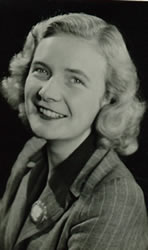 Iris worked in City and Guilds (CGC) at the College and David was a student at Royal School of Mines (RSM) from 1942-46, Student President from 1946-47, he was also the President of the Chaps club. When asking questions Anne refers to a document entitled ‘Highlights of my Life’ which David wrote shortly after he was diagnosed with lung cancer.
Iris worked in City and Guilds (CGC) at the College and David was a student at Royal School of Mines (RSM) from 1942-46, Student President from 1946-47, he was also the President of the Chaps club. When asking questions Anne refers to a document entitled ‘Highlights of my Life’ which David wrote shortly after he was diagnosed with lung cancer.
AC Iris please just tell us your name and where you were born
I P-D My name is Iris Pritchard-Davies (pictured right) – it was Kent when I was single and I was born in London in 1926 and I worked at The Imperial College in London
AC Ok well before we just jump to there can you tell us just in a few words where you went to school and what your qualifications were?
I P-D I went to the local government school originally in Maida Vale in London and then when I was about 7 we moved to Greenford which is near Harrow in North London and I went to the local school there and later did a secretarial course at Pitmans College in Ealing and then when I left Pitmans I went to work at Imperial College in South Kensington. Imperial College was divided into 3 faculties the largest was The City and Guild College and that deals with engineering …civil engineering, chemical, electrical and aeronautical engineering.
Then there was The Royal College of Science which is mainly physics and chemistry and the last of the three colleges making up the faculty of Imperial College is The Royal School of Mines – it obviously deals with mining engineering, surveying and geology
AC So which one did you work in?
I P-D I worked in The City and Guild College- I worked for a professor of aeronautical engineering
At that time we had air raids – we used to take shelter by ducking under the space of a roll-top desk and that’s about all, there were no shelters or things of that sort.
There were a few bomb scares – in Exhibition Road in which Imperial College was situated there were a couple of houses damaged mainly by shrapnel rather than direct hits from bombs
It was during the flying bomb period of the latter end of the war.
AC What did they call those?
I P-D Buzz bombs
The buzz-bombs things were really quite scary because you heard them coming – and then suddenly there was silence and that was when they were about to drop – silence and then an enormous explosion which if you were lucky enough to hear it obviously meant it had hit someone else and not you.
AC Did you ever hear one?
I P-D Yes, we heard lots of them around there and we were very fortunate not to take any direct …
AC I’m not sure of the geography - have you got any idea what they might have been aiming at?
I P-D Oh, I think they were directed generally at the city of London - it was all part of the campaign to hit the civilian population.
AC And who were you working for then?
I P-D I worked initially for a Professor Leonard Bairstow who fits the picture one conjures up in ones mind of the absent minded professor, he was typically that
He had a theory that all letters answer themselves if you leave them long enough, so he dealt with his own personal post by opening up the top of an old fashioned roll-top desk throwing the letters in and saying “There you are … go in there … if they want me they can get me on the telephone …”
But he was a very well-respected aeronautical engineer – he was later knighted so I finished up working for Professor Sir Leonard Bairstow.
But he also had what in Australia one would call an ‘offsider’, Professor Hill, and he was the one who did the day to day answering of the letters that didn’t go away.
And then later Professor Bairstow retired and I worked for Professor Arnold Hall, who was also knighted.
He was a very different personality entirely from Professor Bairstow – he’d been a very clever addition of the staff of the Royal Aircraft Establishment in Farnborough and he wrote many publications and was made a professor at the age of 33, which is extremely young.
He was a very clever man but not absent-minded at all.
So that was the staff …
AC And you had obviously cordial relations – you enjoyed working there?
I P-D Oh yes, it was a most pleasant atmosphere – although a lot of the work was fairly important there wasn’t the sort of day to day stress that occurs, I imagine, in a commercial office.
A lot of interesting people came and went – a very pleasant atmosphere altogether.
We had as I say a few air raid scares – we used to duck under the [desk] … between the little knee space of the roll top desk, which I shared with Professor Hill – who was rather rotund- but he was very formal and when the air raid siren went he would sort of stand aside and give a little bow and say ‘After you Miss Kent…’
And we both finished up scrambling on our hands and knees in this little space but … with great formality
Very cosy yes …
AC And he would have called you Miss Kent I’m sure
I P-D Oh yes, yes
AC And did you meet his wife?
I P-D I did actually – he lived out at Denholme/Denham [?] near the film studios and I went out there several times and had meals and things, but I still remained Miss Kent.
A very nice family.
AC And so .. were you working there when you met David?
I P-D Yes, I went to a dance at the Imperial College Union as they call it – it makes one imagine a sort of trade union but it was just the social centre of the Imperial College
And I went … I can’t remember who I went with certainly not with David but they had a dance, a Cinderella dance, where the woman had to put a shoe in the centre of the room and the man picked out a shoe and fitted it on to the girls foot and that was that …
So I accused him much later of choosing my shoe because I’ve got big feet and he always liked value for money … but he said no no, he knew whose shoe he was getting.
AC And so what was he studying?
I P-D He was doing mining engineering … just before I met him he’d had to take a year off because he’d had meningitis and the medical people thought that he would not be fit enough to do underground work and this resulted in him taking rather a long university course because he missed a whole year for being ill and then at the end of it he’d already got a mining engineering degree which would have involved underground work.
But he took a degree in geology which was – surface – geological surveying.
AC So that’s why he did that – his health?
I P-D Yes, it was a health thing and in actual fact he enjoyed that very much more than the actual mining – so he had a double qualification, he did get a mining engineering degree and then he got a geology degree
AC And did he do them both at the RSM?
I P-D Yes, he did them both at the RSM and used both to a certain extent - when he went to South Africa he was able to use his mining degree but he didn’t do a lot of underground work, he did mainly geology.
AC So you met him at the ball in October 1944 according to this, so tell us about the D-Day episode
I P-D Oh …Well do you mean… the actual..?
AC No, I mean the story about Doubleday pies
I P-D Oh yes they had a rather amusing episode before the actual D Day in London coming down towards the end of the war and it was rumoured that there was going to be what they called D day which was when England sent troops ashore to liberate Europe and this was … D Day.
And coincidentally the students at Imperial College had been very dissatisfied with the pies they were getting in the canteen produced by a firm called Doubleday … I suppose it was towards the end of the war and I suppose it was very heavy pastry more like cardboard with some splosh in the middle so they had a strike and made all these posters saying ‘This is D Day This is D Day’.
Most extraordinarily it coincided with the day of the invasion of the troops and so Scotland Yard turned up in full force to find out who had blown the gasket, spilt the beans that there was going to be an invasion that was labelled D-Day and of course it turned out to be a protest about pies but it caused a great furore – quite coincidental but it strangely happened.
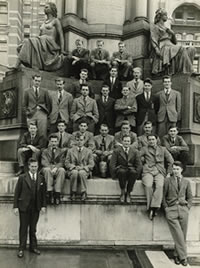 AC Do you know anything about The Bottle Matches?
AC Do you know anything about The Bottle Matches?
I P-D Oh not a lot – there was a huge bottle that was always played for among the three colleges I think because the RSM seemed to have perhaps a tougher brand of student they nearly always won the rugby match.
I think the RCS had more brains than brawn so it came down to a tussle between City and Guild, which was various forms of engineering, and the RSM and it became a great thing to win this match.
They did play other colleges of course but not for this trophy … (pictured left, with the chaps club with bottle 1945-46. Top row, L-R, M Gawthrop, P.I. Togni, D.G. Gibson; second row, L-R, W.H. Tinker, A.J.Self, G.E. Pearse; third row L-R, P.A. Rankin, C.P. Garner-Richards, J.C. Hayward, F.R. Phillips, M.P. Robinson, S.E. Churchfield, F.E. Tennant; fourth row, L-R, A.I. Eckersall, W.F. Scriminger, P.G. Ward, P. Harding (holding bottle) T.A.A. Quarm, G.J. Mortimer, A.E. Holding; fifth row, L-R, D.J. Simmons, R.A.L. Black, D.A.O. Morgan, R. Wheeler; final row, L-R, L.E. Smith, E.W. Pritchard-Davies).
AC Not for The Bottle – what sort of bottle was it?
I P-D A great big sort of … like a laboratory bottle … not one of the big round ones but it had … I suppose it was like a very large square … what we would regard as a gin bottle now with large squarish shoulders, that was the general shape of it.
AC And you don’t know what the significance of it was?
I P-D I think that somebody at one stage, way back, must have taken it to a rugby match and then it became something to win. If you could get it away from the opposite side that was a little triumph … so that was that …
AC So what about Henley …
I P-D Oh yes we didn’t do it in much style I’m afraid. David and another friend managed to get a canoe which came apart so they had this canoe in a sort –of canvas bag which they sort -of carried on their back much to the annoyance of everybody on the buses and trains
We assembled it when we got to Henley, I with great trepidation … anyway it managed to hold itself together … slotted together on the river bank, not terribly waterproof
Anyway the Henley thing was quite a big deal
AC Was it a university regatta?
I P-D Yes it was … and Imperial college put in their boats but there were boats from University College … it was quite a big affair …to pay for the … um … the wealthy people… we didn’t have a car needless to say so we were sort of hitching-hiking on the backs of lorries and one thing and another so we arrived looking decidedly un -regatta –like as far as the fashionable people were concerned… but it was great fun and much looked- forward to …
AC Now here we’ve got 4th of May 1945 ‘VE Day with Iris’… do you remember that?
I P-D Oh that was the official Victory in Europe …and then later in August was the end of the war with Japan … so they had the usual, well, celebrations and street processions and … bearing in mind that it was still very much just after the end of the war and things were on an austerity basis but.. um … but it was a great celebration and people were out in full force …
AC And evidently according to this in September David was elected RSM and Imperial College president …
I P-D Yes he was the president and they had the Imperial College Centenary [of the Royal College of Science] while he was president …
AC But then the next entry is 25th October at [Royal] Albert Hall Centenary [commemoration]
I P-D Queen Elizabeth, the Queen Mother, was the patron of the Imperial College and she was at the ball and David had the honour of opening the ball by dancing with her for the first dance.
It was just after the war when people were still … more or less austerity minded and so on but she … wore one of her … what became famous sort of crinoline type dresses and looked very glamorous with a tiara so that was a great … moment in his …
AC Were you there, did you go as well?
I P-D Yes, I went yes … I was lurking in the background and then I managed to dance with him later after he’d … done his …
AC You danced with a man who danced …
I P-D.. with the Queen Mother .. yes
AC December – Mines Carnival – do you remember what that was? Red tape?
I P-D Oh that was a fancy dress yes – David wrapped himself in red tape and went as a red-tapeworm.
And I yes I can’t quite remember [what I wore] …I had this stupid … Oh a dress I don’t quite know what I was supposed to be but I know that at that time I used to go ice skating in a very short full skirt and I sort of wore that as part of the fancy dress .. I’m not sure what I was supposed to be but people didn’t ask too many questions …it was a question of what you could do … something … you know
AC Was that a university carnival?
I P-D Yes, Imperial College … a mixture of all three colleges yes
AC Right so then he’s got in 1946 he is a demonstrator in geology so where was that at?
I P-D Oh that was at the RSM – he had a part-time job which paid a pittance as a salary but very welcome, because needless to say we were broke, he was broke, we were both broke so that was that …
He went down to Cornwall on a vacation job I think …
AC Yes the china clay pipeline survey
I P-D Yes he enjoyed that I think, was there for quite a while…
AC And then also mineral geology course started
I P-D Well it was decided about that time he’d got a mining engineering degree but because of is previous history of meningitis and pneumonia etc that he probably wouldn’t’ get a red ticket to do mining engineering so he did a geology course which meant he’d work on the surface and outside – a double degree which was very useful
AC He did also a geological survey at Tintagel?
I P-D Yes
AC Dec 1946 , then he’s got -early1947 geological mapping High Force Middleton Derbyshire
I P-D Yes
AC So was David in the Rugby First 15 at the RSM?
I P-D Yes he was
AC 1943 Sept he was elected president of The Chaps Club – what was The Chaps Club?
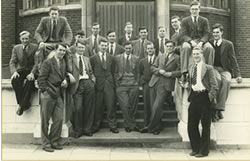 I P-D Oh what shall we say an elite little group in the RSM only … they just called themselves the chaps, The Chaps Club (pictured right) and it was limited to about 15 members I suppose, and I suppose it was really just a social – drinking – let’s say it’s a drinking club they used to meet in the bar and he was the president
I P-D Oh what shall we say an elite little group in the RSM only … they just called themselves the chaps, The Chaps Club (pictured right) and it was limited to about 15 members I suppose, and I suppose it was really just a social – drinking – let’s say it’s a drinking club they used to meet in the bar and he was the president
AC So it was very informal…
I P-D Oh yes, nothing to do with the university as such
AC So it was principally, drinking .. was their .. thing - and do you remember - did they play those drinking games do you remember? Cardinal Puff?
I P-D Oh I think they did they had ..yes … what shall we say … the initiation ceremony was to drink quite a large – bigger than a tankard – a big container of beer and you had to drink it all down in one … you know stupid male thing … proving yourself .. and everyone stood around – I’ve never .. women were never involved but it was always this sort of … ‘ down down down down …swallow in one go as it were …
I don’t know what happened if you didn’t do it – I don’t know if anyone got refused.
AC Now he wasn’t too young to be called up but he had been ill …
I P-D Well he didn’ t get called up because he’d had meningitis and double pneumonia – he actually didn’t pass the army fitness test..
AC The fact that he had three brother in the forces … would that have been significant?
I P-D I don’t know - I think it was on a health basis.
I was amazed that he got a red ticket, which you have to have to work in South Africa – a red ticket means you can work underground – and he passed that but was advised that he shouldn’t really put in the number of hours –that’s when the geology came into it …. I think it was a very good idea because he found geology a lot more interesting … you know.
AC People like David, when they were students, did they have to go and do work in the fields in summer you know, help get the harvest in? Land Army it was called wasn’t it?
I P-D Yes
AC You didn’t have to do that because you were working?
I P-D No a couple of times we went on an army work camp, I went as well but it was all very proper they had separate obviously very unglamorous accommodation womens’ quarters and mens’ ’quarters. We got 2/6 an hour for working and then later on the second time we went we had what was very much easier assignment - picking tomatoes in a greenhouse.
AC He was the only member of the family to go to university wasn’t he?
I P-D Yes he was [digression]
AC So by the looks of this David starts university in 1941 and in 1942 he gets an Open Mining Scholarship 150 pounds a year that would have been quite a lot of money – was that a living allowance?
I P-D Yes it was and he lived in the college there – it didn’t leave a lot over but ...
AC And a Croydon Scholarship
I P-D Yes both of them he applied[for] and won on merit as it were.
AC So he started at the RSM in Sept 1942 – he’d got those two scholarships – and he stayed at the YMCA
I P-D Yes that was 100 pounds a year boarding allowance [fee ?] That was about it, it was pretty tight money really you know, but he managed. He initially started with the YMCA and then moved later into the college.
[May 1947 saw the end of college, and in July both Iris and David went to a Farm Camp, then to a Butlin holiday camp, where Iris won a beauty prize.
From the end of July to the end of August David was based at Hackbridge Cable Works.
On the 9th September 1947 David left Southampton for South Africa.
Iris was able to join David in South Africa in July 1948, having applied for a permit to get a passage.
By this time David had been sent to Tanganyika and they remained there until December 20th and they were married in Johannesburg in January 1949.]
© 2007 Imperial College London
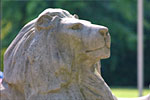
Through the first decade of the twenty-first century the campaign seeks to philanthropically raise £207 million from Imperial’s alumni, staff and friends, and donations from charitable foundations and industry.
Where your support can make a differenceGive now
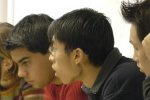
Imperial’s Centenary Year provides an opportunity to recognise and celebrate members of the Imperial community.
View staff and student portraits
